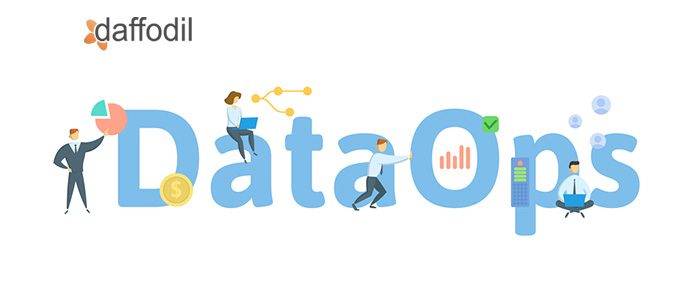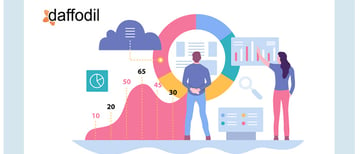
DataOps is a collection of methodologies that has been taking the data management domain by storm. As we know, DevOps is the natural result of applying lean principles such as broad focus and continuous improvement to application development and delivery. DataOps takes these principles and applies them to data science.
Data specialists such as data analysts, data developers, data engineers, and data scientists can bring continuous delivery to systems development life cycles. This helps to focus on the collaborative development of data flows and the continuous use of data across organizations. More and more people are injecting data science-related methodologies into the software development sphere, which makes it important to understand what DataOps tools are all about.
In this think piece, we will do just that as well as understanding the underlying principles of this emerging DataOps platform. We will also take a deep dive into what the real-world applications of DataOps tools could be.
What Is DataOps?
DataOps is a conglomeration that brings together DevOps teams with data engineers and data scientists for agile and process-oriented analytics. These teams congregate to bring forth the relevant tools and develop skills to support data-focused outfits with organizing the structure of the raw data that they possess or collect. Understanding how the DataOps vs DevOps comparison works matter as well.
For a theoretical definition, DataOps translates to the ability to provide solutions, create data products while activating data that has business value across enterprise systems. DataOps tools work towards the end goal of streamlining the design, development, and ultimately the maintenance of data analysis-based applications. Despite all these industry-defined terminologies, people still make the false assumption of considering DataOps as plainly DevOps for data.
While this is a misleading statement, DataOps vs DevOps are only semantically distinct. The DataOps architecture basically communicates that data analytics has the tendency to achieve what the software development lifecycle managed with DevOps. This architecture deals with accelerating data analytics while at the same time managing dynamic data operations.
Know More About: Data Management Services
DataOps And Continuous Analytics
Continuous analytics is a very recent development in the domain of DataOps platforms. The use of complex batch data pipelines and extract, transform, load (ETL) are avoided for use of the cloud and microservices for operating on data. This method is very useful for enterprise-level data management with continuous data processing with the right DataOps tools.
Continuous data processing allows for real-time interactions to provide immediate insights that utilize only a handful of resources. The continuous mode of functioning is meant to run multiple processing states that enrich, analyze and act on data without actually saving the data involved in a DataOps architecture. The tasks of IT engineers and data analysts are made easier as continuous analytics using DataOps tools draws insights from data much faster than traditional data analytics.
While traditional data analytics separates data scientists from the mainstream software development sphere, the continuous approach in DataOps architecture brings both teams to work in close collaboration. Big data teams can write code using the same data repositories as the software developers to release applications based on DataOps architecture in a series of short but meticulous work brackets. New ways to combine the writing of analytics code with installing big data software, with automated software testing are currently being researched.
Customer Success Story: Redeveloping an omnichannel Point of Sale (PoS) application for an Indian unicorn
The Benefits Of DataOps
DataOps tools and practices supplement the existing inflexible systems of data processing and poor quality of data. The tools and processes facilitate highly reliable and accelerated data analytics. Some of the benefits involved in the implementation of DataOps are as follows:
1)Data Democratization: It is not just the data scientists and data aggregators that need access to the company data. External stakeholders including CEOs, data scientists, IT, and general management should all be able to access it. Providing this access is the first step in moving towards a DataOps architecture.
2)Diversifying Data Analytics: The central thought governing DataOps platforms is the use of multifaceted analysis techniques instead of sticking to one successful strategy. As proof, new machine learning algorithms for properly guiding data through the several stages of data analysis are gaining steam. DataOps tools specialists can successfully collect, process, and categorize data using newer principles that they can innovate upon repeatedly.
3)Flexibility In Process Selection: The entire workflow within an enterprise system can change if there is enough flexibility in the selection of data analytics and DataOps tools and methods. An organization can function without boundaries opening gates to new opportunities facilitating a paradigm shift.
4)Long-term Practice Adoption: The practice of data management must be a continuous one that is implemented over a long duration. Multi-tenant cooperation between various stakeholders in the data management process is to be a long-term strategy so that it becomes a standard. Once these practices are combined with machine learning with multiple iterations of data processing, DataOps tools can be automated to allow data scientists to innovate expansively.
DataOps In Practice
Once an enterprise implements DataOps tools in some way or form throughout the organizational structure, it must move on to understanding the factors of scale. Data management strategies must deal with data at scale and also in response to organizational events as they happen. There should be no siloed roles as they exist in traditional organizational setups.
Big data organizations undergoing a digital transformation must let go of siloed roles in favor of cross-functional teams. So-called skill siloes such as operations, software engineering, architecture and planning, product management must ensure mutual collaboration over data management projects. Data scientists must be embedded in DevOps teams. Instead of a DataOps vs DevOps conversation, we must plan to combine the two.
Many DevOps teams have data scientists embedded in them for a particular time being, mainly for as long as the team needs some form of data analytics or insight gathering. These data scientists are shadowed by developers to learn their capabilities and responsibilities. These developers can then take on the role of a data engineer and let the data scientist can then move on to the next team. This is how organizations tend to save on the heavy expense of retaining these valuable yet pricey resources.
ALSO READ: GitOps:The Next Big Thing in DevOps?
Accelerate Data Analytics Insights With DataOps
Organizations that have a DevOps team in place already have the basic requirement for implementing a DataOps paradigm. If the organization tends to work with a lot of data-intensive development projects, then it needs to add some data training to its DevOps teams. This training could be just for aligning a data engineer or a specialized data scientist role for the long run.
Either way, in this age of heavy data aggregation which is growing in volume exponentially, it is essential to better equip your DevOps teams with DataOps as well as data management services. Learn how you can take the first steps towards this move through a free consultation with us.



